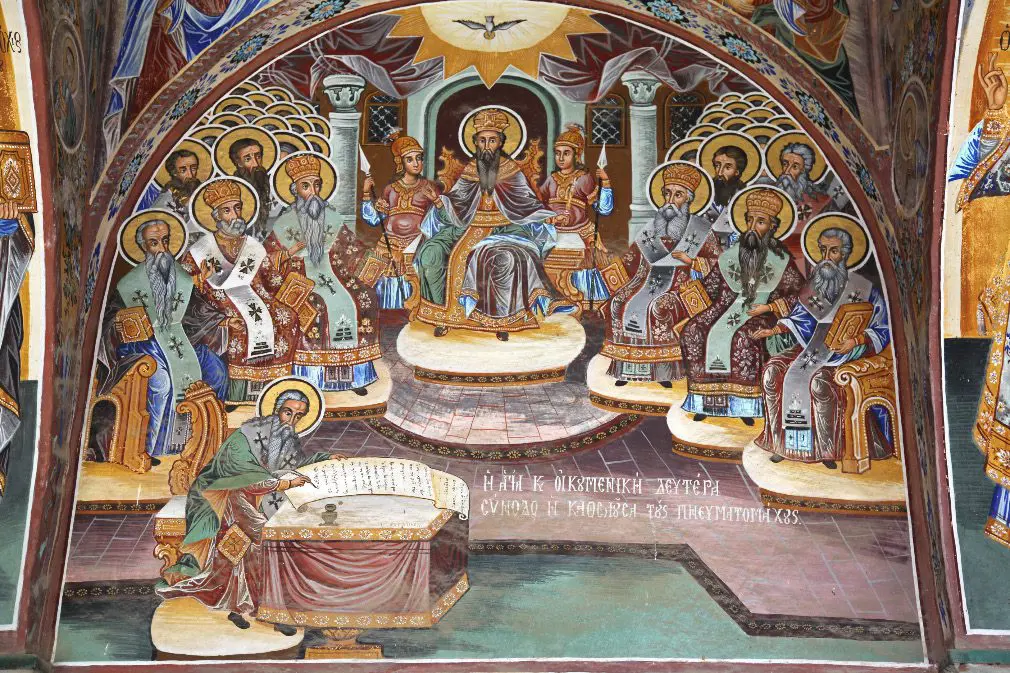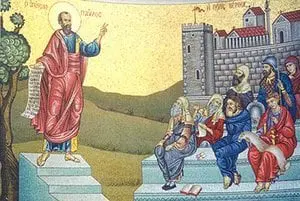Church-legal aspect
After the regulation of the Arian problem with the first canon, the Second Ecumenical Council in its 2nd Canon emphasized the next main point for the reaction of the anti-Nicaean party against the trampling of the metropolitan autonomy and the authority of the provincial synods / councils as a final court. changing the status of the council convened in Serdica from an ecumenical to a local one, and also limited the appetites of the Roman bishop for supremacy. Pope Damasius (366-384) ratified the Creed at the Second Ecumenical Council, held in Constantinople (381), at which new Trinitarian heresies were exposed, but did not accept only the 3rd canon of the same council, which gave precedence. of the Bishop of Constantinople, on equating the dignity of the Primate of New Rome with that of the Primate of Old Rome.
This extremely important rule begins with the words: “District bishops should not extend their authority over churches beyond their district.” A number of other rules of ecumenical and local ecclesiastical councils also stipulate that the affairs of ecclesiastical administration in all dioceses be under the authority of the council of each district (Ecumenical, 4, 5, 6, 7; Ecumenical, 3). ; III Ecumenical 8; IV, 17, 191 28; Trullo 8, 25, 36, 38, 39; VII Ecumenical., 3, 6; Antioch 9, 16, 18, 19, 95, 98, 120; Serdika 3 ; Double 14).
The starting point for us is Canon 5 of the First Ecumenical Council, which prescribes that no one should accept those excommunicated from their own bishops, is in sync and is reaffirmed by many canons: Apostle. 12, 13, 16, 32, 33, 34, 37; ІІ Ecum. 2, 6; IV Ecum. 11, 13, 19; Trul. 17; VII Ecum. 6; Antioch. 6, 7, 8, 11, 20; Laodicean. 40, 41, 42; Heart. 9, 13; Carthage. 11, 18, 23, 29, 73, 106. In his interpretation, Zonara, Aristine, and Valsamon unanimously note that because some are excommunicated unjustly, perhaps out of anger or cowardice of the excommunicator, or out of some bias, the Fathers of the Church have ordered that this rule be subject to excommunication, in case the excommunicated complain of an unjust trial, and that this examination be carried out by the bishops of the district. The Holy Fathers ordered these regional councils to be held twice a year (later it was decided to hold these provincial or regional church councils at least once a year) and ordered them to hear such appeals at second instance. The ecclesiastical-legal interpretation in the Slavic Helmsman’s Book and in Ep. Nicodemus also emphasizes that the 5th canon of Nicaea aims to prevent the abuse of power by bishops in the trial of their subordinate clergy and laity, whereby the convicts are given the right to appeal to the district council; as well as to forbid the decision of one district church from a council of another such church, therefore, the final decision of a case belongs to the proper regional council, respectively the time for convening the annual regional councils is determined. Such an understanding is attested to us by the bishops of the Carthaginian church, e.g. St. Cyprian in his letter to the Roman bishop Cornelius (S. Cyprian, epist. LV ad Cornelium – Migne, s. I., t. 3, col. 821-822) or the message of the Council of Carthage from 424 to the Roman bishop Celestine on the excommunicated African presbyter Apiarius, who appealed to Rome to reconsider his case at second instance, in which it was clearly stated that he had reasonably acknowledged the Council of Nicaea, in the event of dissatisfaction with the decision of the local judges, to appeal to the district council or to the ecumenical council ( quoted in the epic Nicodemus Milash, – see the Rules of the Holy Orthodox Church with their interpretations, vol. I, Sofia, 1912, pp. 280-281); cf. Can. 1 of the Council of Carthage – the decisions of the Council of Nicaea to be observed.
Western participants questioned the metropolitan autonomy of the Eastern bishops and their councils, and this provoked the latter to fight fiercely in defense of the autonomy of the metropolitan administrative system. Ep. Osius of Cordoba, aware of the canonical grounds of the Eastern group of bishops, tried to persuade them not to boycott the universal character of the Council of Serdica not with theological or ecclesiastical-legal arguments, but with a request – “if it pleases your love” (si vestrae dilectioni videtur).
Moreover, it was in Serdica that the intention of the Roman bishop to appropriate a supra-metropolitan authority was expressed. Julius of Rome insisted that he had the right to settle church matters, even outside his jurisdiction. Outraged Eastern bishops reacted against these attempts to seize power in the Church of Christ to the Pope. That is why they wanted the issue to be discussed with them at the council itself for a final decision on their appeals against sentences already imposed by the council. Local councils in the West did not have the right to revoke, or reconsider, decisions of local councils in the East. Only one, with the rank of Ecumenical, council, such as that of 343, convened by the two emperors in Serdica, had the right to rule on such an issue. The Ecumenical Council was to decide on the Nicene Creed. This symbol, made at the First Ecumenical Council in 325, could also be rejected. It was intended to debate whether to accept or reject. During the negotiations between the two groups, the emphasis shifted to the anti-canonical act of Julius I – to receive in communion bishops who had been overthrown by Eastern councils.
The Eastern Episcopate of the Council of Antioch at the Sanctification of 341, in response to Julius and the Council of Rome convened by him in 340, formulated two council rules referring precisely to the case of St. Athanasius to prevent his final return to Alexandria department. Thus, according to the 4th rule, a deposed bishop, who by a decision of a church council, who dared to continue his archpastoral functions, loses forever the right to be reunited. From Zonara’s interpretation of this canon, we understand that the trial of bishops accused of crimes requires a council that judges and decides; if a bishop, overthrown by a council, dares to perform a sacred service, not to be allowed to appeal for a review of his case, and those who are in communion with him and know about the sentence taken against him, to be excommunicated. the church. Aristine summarizes that if a bishop overthrown by a council performs, due to perseverance, worship – he cannot be reinstated or given the opportunity to be re-defended (ie the right to appeal) and acquitted before a larger council (to a higher court) and cannot hope to ever take his previous place. The rule also extends severe punishment to those who have entered into communion with such a person or have served with him.
According to the 12th rule, a bishop, deposed at a church council, who seeks protection from the emperor /i.e. by the secular authorities/ instead of submitting their case for reconsideration to a higher council, he loses forever the right to receive forgiveness, he has no right to raise his appeal for reconsideration and can only leave any hope of being restored to his former rank. It is allowed to turn to the “greater council”, ie to the Ecumenical Council, which alone has the competence and authority to consider at second instance entered into force sentences and disputes from the provincial councils. And Rule 11 of the same council strictly forbids bishops and clergy to go to the royal palace without the necessary diploma from the proper bishop and without extreme necessity, and those who violate this canonical decree will not only be excommunicated but also overthrown.
The canons of the Council of Antioch stipulate that a bishop may appeal to a larger council, provided that the bishops who have previously condemned him have not all agreed, i. some of them found him guilty, others – innocent / f. canon 14/.







